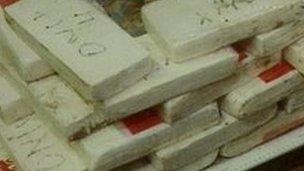Guinea-Bissau drug trade 'rises since coup'
- Published

The UN Security Council has expressed concern that drug trafficking in Guinea-Bissau has increased since the coup in April.
It demanded that the country's rulers restore constitutional rule.
Guinea-Bissau has a long history of coups since independence from Portugal in 1974.
It has also become a staging post for gangs smuggling cocaine from Latin America to Europe, allegedly in collusion with top army officers.
"The members of the Security Council condemned the continuing interference of the military in politics and expressed their concern with reports of an increase in drug trafficking since the April 12 coup d'etat," the Security Council said after a meeting in New York.
It said it was considering calling an international summit to discuss how to achieve democratic rule in Guinea Bissau.
'Kingpin'
In May, the Security Council imposed travel bans on the coup leaders and their key supporters.
The military has agreed in talks brokered by the West African regional body, the Economic Community of West Africa States (Ecowas), to return the country to democratic rule, but has so far failed to do so.
In 2010, the US accused senior military men from Guinea-Bissau, including former navy chief Jose Americo Bubo Na Tchuto, of drug running.
Under the Drug Kingpin Act, financial sanctions were imposed on the officers.
No elected leader in nearly 40 years of independence has finished their time in office in Guinea-Bissau
- Published21 June 2010
- Published23 August 2010
- Published26 February